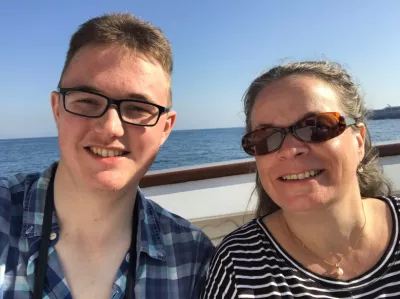
When it came to my son, Owen, transitioning to adult epilepsy care, there were so many thoughts and worries. He had had the same paediatric consultant for almost 10 years and the same epilepsy nurse, who our whole family essentially had 24-7 access to for most of this time. They knew us and the history of his rollercoaster epilepsy journey so well. It was a daunting thought to have to explain it all to someone new. Due to the complex and fluctuating nature of his epilepsy, he was still in paediatric care at the age of 18, so in a way we had a ‘safety blanket’ in terms of healthcare for longer than a lot of families. In paediatrics, as a parent you are involved in so much and are at all the appointments and receive the letters from clinics too. However, we knew at a certain age we needed to ensure that Owen became the main voice in his care plan and treatment. To try and encourage his independence before he moved to adult care, he took on the responsibility for ordering his medication, but we oversaw and intervened when there were any problems with prescriptions or stock control of meds.
Our main worries about the transition process were:
- How much input would the paediatric team have in the process? We knew that some hospitals have a joint transition appointment where the paediatric and adult health care team meet with the young person and the parents – but our hospital’s transition process meant that the paediatric team had to just hand over their notes to the adult team
- How well would Owen be able to manage the organisation side of appointments, clinic letters, following up/chasing info, managing medication supply, requesting repeat prescriptions?
- Would he be able to prepare for/understand/take in/process/remember the discussions and decisions made in appointments?
- The fact that we would no longer be able to stay with him or be involved with discussions and decisions should he find himself in A&E, having to be admitted to hospital post seizure or for investigations or tests
All the above would be a worry for any parent but the very nature of epilepsy and the impact of medication means that they were very real concerns for us and we didn’t want them to be overwhelming for Owen.
In fact, overall, our experience of transition was more positive than we thought it would be. Owen was now under the care of a new epilepsy specific neurologist who spent a good hour with all of us at his first appointment. In the appointments to follow Owen would go in first and then, with his permission we were able to join the appointment. This made it possible for us to hear what they had discussed and what they had agreed were the next steps in his treatment care plan. We could then also ask questions and voice any concerns we had.
We also found that referrals with the Neuro Psych Team happened quicker than they would have with CAMHS. We also appreciated that there were straight discussions about alcohol, drug adherence and SUDEP with the adult team – they were very happy to have ‘to the point’ discussions.
There were some elements that we found difficult. After being able to have such regular contact with our epilepsy specialist nurse in paediatrics, we now didn’t have any ability to contact the team between appointments unless Owen went to the GP for a referral.
There were some elements that we found difficult. After being able to have such regular contact with our epilepsy specialist nurse in paediatrics, we now didn’t have any ability to contact the team between appointments unless Owen went to the GP for a referral. His Epilepsy Specialist Neurologist also left the team whilst Owen was under their care, and Owen only found this out when he chased up about an overdue appointment. We found it difficult to strike a balance between stepping away and giving him complete independence and control and reminding/nudging him without being a helicopter parent!
The hardest part of all was having to leave him in A&E overnight, not knowing the next day where he was, how he was, or indeed if he knew where he was and what was happening.
For other parents whose children are approaching the age of transition, my greatest pieces of advice to you are:
- Talk and discuss your fears and concerns with your child so they understand that the transition process is difficult for all of you and that you just want to be able to support them in the most appropriate way
- Reassure them that you are still there for them
- Be proud when you see them managing their condition and making responsible decisions
- Always celebrate the highs and be there to support and pick up the pieces in the aftermath of the lows


